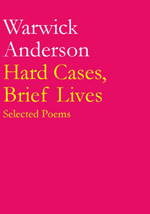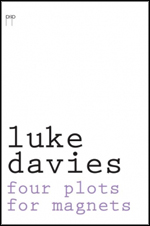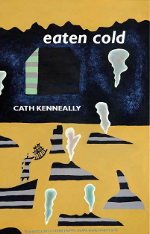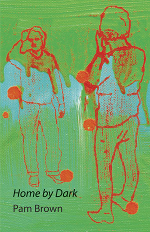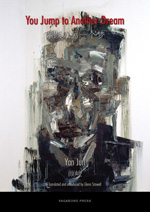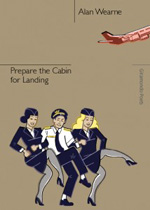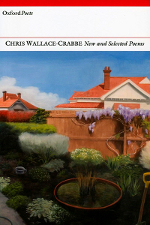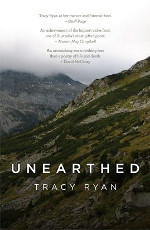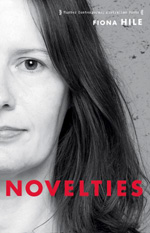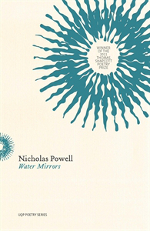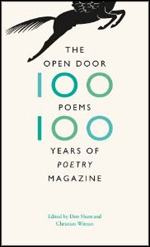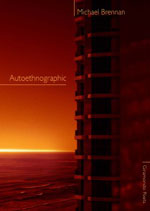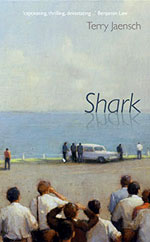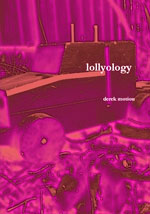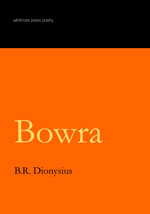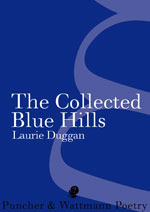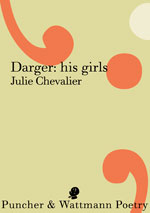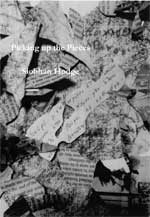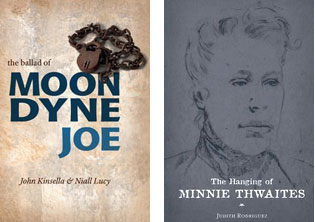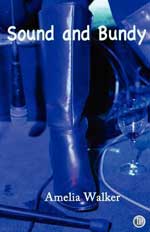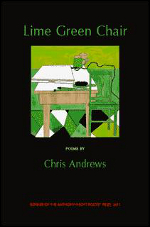BOOK REVIEWS
Review Short: Philip Hammial’s Detroit
Philip Hammial is the author of over a score of poetry collections. With his new book, Detroit, he returns to the city of his birth taking us, the reader, on his helter-skelter ride. From the first, a poem entitled ‘Mayday’, we are already travelling at break-neck speed, suddenly materialised in an alley with three unlikely characters, plus a bear and a looming summary execution. We enter and leave the poem in the thick of action and must imagine for ourselves the backstory and outcome. In twelve short lines I am already empathising with the un-named first person speaker to imagine him slipping free of the medieval fresco sky-hook descending from the heavens.
Review Short: Warwick Anderson’s Hard Cases, Brief Lives
The manner in which poets divide their lives is of enduring, perhaps obsessive, interest to me. More specifically, I’m interested in what they choose to reveal or emphasise, and what they let slide to the background of their visible identity.
Review Short: Luke Davies’ four plots for magnets
The first book with this title, containing 13 poems, was first published in 1982 in an edition of 300 copies. This version contains the original 13, plus another 53 previously unpublished poems from the same era, a foreword from the poet and an afterword from the original publisher, S.K. Kelen. This is more than a reissue or a new edition. It is a comprehensive collection of Davies’ works from the early 1980s and it is to be valued for the light it sheds on the development of one of Australia’s best regarded poets.
Review Short: Cath Kenneally’s eaten cold
In The Sacred Wood: Essays on Poetry and Criticism, T. S. Eliot famously wrote, ‘Immature poets imitate; mature poets steal; bad poets deface what they take, and good poets make it into something better, or at least something different.’
Justin Clemens Reviews Pam Brown
What does it mean to be ‘Home by Dark’? Is it a parental instruction to a potentially wayward child? Is it an expression of relief after a day of threat and uncertainty? Is it a navigational expression, a crepuscular refiguration of ‘North by North-West’? Is it a simple description of an accomplished movement, or another possibility altogether? To open this book is not to find such questions answered; it is rather to move and be moved with and by somebody who, as the epigraph from Kevin Davies has it, is prepared to ‘just keep staring into that English-language night sky.’
Review Short: Yan Jun’s You Jump to Another Dream
Yan Jun’s poetry works through his experience of contemporary China by employing an aesthetic that is traditionally grounded in observation of the momentarily significant. He is captivated by the dazzle of a new consumerist culture only when that dazzle is spectral and fleeting. In an interview with Cristen Cornell (‘Lost in the Supermarket with Yan Jun’, Artspace China blog, University of Sydney) he decries the consumption culture’s take on art as a ‘production process’ which removes ’the possibility for uncertainty’ and what is ‘unknowable in individuals’. He comments on the inextricable logic of cultural monuments such as the Forbidden Palace being preserved while the traditional living areas, the Beijing hutongs, are pulled down, symptomatic of a daily life becoming ‘more and more deprived’.
Review Short: Alan Wearne’s Prepare the Cabin for Landing
Prepare the Cabin for Landing, as with much of Alan Wearne’s poetry, draws on popular culture, social observations and the Australian vernacular. I recall reading a review of an earlier Wearne collection which warned the reader that they would require a Wearne dictionary in order to understand the cultural references being made. Of course, no such dictionary exists, and as Adam Ford has argued previously in Cordite Poetry Review, Wearne’s poems can be difficult unless you are ‘either amazingly well-read or precisely of Alan Wearne’s generation (and interested in the same things as him) to have the right combination of knowledge, memory and experiences to understand or empathise with every poem in this book.’
Geoff Page Reviews Chris Wallace-Crabbe
Now a youthful 79, the Melbourne poet, Chris Wallace-Crabbe, has been an important figure in Australian poetry since the early 1960s. As a teacher, scholar, anthologist and organizer – as well as a poet with at least fourteen volumes to his name – Wallace-Crabbe has been central to much that has happened in Australian poetry over the past fifty years, especially in Melbourne. As with his friend, the late Peter Porter, Wallace-Crabbe’s lightly-worn erudition and distinctive sense of humour have ensured that his work is admired by many poets (and readers) across the aesthetic divisions in our poetry reaching back to the 1970s.
Review Short: Tracy Ryan’s Unearthed
Tracy Ryan’s seventh full-length collection of poems, Unearthed, comprises of an extraordinary series of elegies and elegiac poems. The elegiac mode here is both intimate and epic in scale. These poems commemorate the most private moments shared with lost lovers – those times ‘relished and wasted’ (12), ‘snug’ in ‘coffin-dark’ beds (32) – as well as the ways in which our inhabited environments – mountains, the plant and animal worlds, even glimpses of the moon – are ghosted by the dead.
Review Short: Fiona Hile’s Novelties
In Lacanian theory, ‘matheme’ and ‘patheme’ share an interesting correlation. While the matheme is, obviously, on the side of science, the patheme is part of the ‘logics’ of affect, whereby the body is an effect of language. Matheme and patheme don’t immediately have anything to do with sexual difference or ‘mechanistic’ versus ‘organicist’ understandings of the universe. There is nothing mysterious about the patheme. Rather, the patheme could be thought of as what the poem does to the poet’s body analogously to what a matheme does to a mathematician’s body: force it to work and, in some cases, give it pain.
Tina Giannoukos Reviews Ali Cobby Eckermann
Ali Cobby Eckermann’s work offers us a compass to our past and present. In poetry, memoir and verse novel, she maps a journey of Aboriginal identity and the historical and contemporary challenges to its integrity and resilience. What emerges is a profound engagement with healing and the articulation of Aboriginal space as always present, alive, intruded upon but utterly felt. She renders legible how ‘Footprints don’t fade / Culture / Kami May’ (‘Mai’, Love dreaming & other poems).
Review Short: Nicholas Powell’s Water Mirrors
Winner of the 2011 Thomas Shapcott Poetry Prize, Water Mirrors is Nicholas Powell’s first full-length collection of poems. Structured around an interweaving of landscapes – some real, others dreamed or imagined – the forty two poems that lead up to ‘The True Map’, the book’s final poem, can read as an exercise in cartography.
John Tranter Reviews The Open Door: One Hundred Poems, One Hundred Years of Poetry Magazine
The blurb tells us that Poetry magazine was founded in Chicago by Harriet Monroe in 1912, and that is it ‘the oldest monthly devoted to verse in the English-speaking world. The magazine established its reputation early by publishing the first important poems of T.S. Eliot, Ezra Pound, Marianne Moore, Wallace Stevens, H.D., William Carlos Williams, Carl Sandburg and other now-classic authors.
Review Short: Michael Brennan’s Autoethnographic
Michael Brennan’s Autoethnographic requires a curious reader, one to read its sketch-like poems carefully. The title, a reproduced image by Erico Tonotsuka and epigraphs by Edward Sapir and John Grey (‘We see the world through eyes of ancient mud’) suggest we should be reading the language of the poems reflexively, with an eye towards their ontological implications. But the poems don’t fit into this frame, and employ plain speech, dark comedy and lyrical melange un-reflexively.
Review Short: Terry Jaensch’s Shark
You stare into the water, starkly aware of the ambiguous shadows there. So many of us are anglers in the Australian poetry scene; looking for something new, something fresh. Having landed this fish on my desk I will confess to a certain hesitancy to come too close. It’s not a large shark, some 60 odd pages generously spaced. There is more than a little empathy for this distressed, vibrant life. But I’m careful of the teeth.
Keri Glastonbury on Derek Motion
The title of Derek Motion’s recent poetry collection lollyology alludes to a theory of lollypops. If, as Urban Dictionary suggests, a ‘lollyologist’ (lollypop maker) is also street shorthand for the ‘most pointless job position in the world’, then Motion is willing to elevate this ‘pointlessness’ to a field of study, or perhaps an art. I’m not sure if this is intended as a comment on poetry and poetics, though with its lurid purple cover image of a toy truck the tone and aesthetics of lollyology appear punkish and juvenile, in a Bow Wow Wow ‘I want candy’ kind of way (although Motion’s ‘indie’ points of reference are more likely The Lemonheads, Dinosaur Junior and ‘another canberra bar / josh pyke’).
Review Short: B.R. Dionysius’s Bowra
B.R Dionysius’ Bowra is a collection of fifty-two prose sonnets of sustained intensity and engagement with place, from the fringes of southeast Queensland’s urban sprawl, west to Cunnamulla, with excursions to California and Kazakhstan. These poems count the human and environmental cost of various man-made tragedies. The fourteen-line constraint works to unravel an anecdote and/or piece of narrative sequence at once self-contained and part of the larger ambition of the book: to serve as a selective local history. The consistently restive and physical language is as uncompromised, and at times bewildering, as the landscapes and situations it describes.
Review Short: Laurie Duggan’s The Collected Blue Hills
I’m far too young to remember the Blue Hills radio serial, which ran for an incredible 27 years, or 5795 episodes. But in my mind, I’ve always aligned it somehow with the long-running serial of a different medium, A Country Practice, and the experience of watching on, for years throughout my childhood. Watching fictional relationships bloom and end and change, watching births and deaths, illnesses and weddings, floods and fires and droughts; and now that I’m older, I can still, sometimes, align parts of its fictional time to the timeline that I experienced in the world.
Review Short: Julie Chevalier’s Darger: his girls
Henry Darger’s reputation as an outsider artist – and the questions of morality lingering around his dark paintings – has inspired recent exhibitions, books, plays and a documentary. Julie Chevalier’s poetic biography Darger: his girls (subtitled a sequence of poems about the life of Henry Darger 1892 – 1973) has come at peak-Darger fever. Chevalier includes an introduction, familiarising us with the debate about what kind of man Henry Darger really was: child murderer, or misunderstood loner? The latter explanation is explored throughout this work.
Review Short: Luke Beesley’s Balance
The poems in Luke Beesley’s Balance, like Siobhan Hodge’s work in Picking Up The Pieces, tend towards brevity (with a few exceptions). In Hodge’s case we might consider this quality in relation to fragments, where the body and the reader’s attention is cut-up. Reading Beesley, the encounter is one that is instead cut-off – that is to say that this is poetry attuned to the momentary and to the sensing body moving through the world.
Review Short: Siobhan Hodge’s Picking Up the Pieces
Picking Up the Pieces is a compact debut of eight poems from West Australian poet Siobhan Hodge. Its publisher, Wide Range Chapbooks, is a Cambridge based small press run by John Kinsella. Wide Range publishes poets such as Redell Olson, Rob Mengham and Drew Milne mixed in alongside young and emerging local poets, many of them students like Hodge (who in 2012 undertook a research residency in Cambridge). The collegial spirit of Wide Range and the relatively modest production values – Hodge’s book comes stapled in a photocopied card cover – suggests a publishing model that favours immediacy and ease of circulation, in a town where poetry and thinking are a constant activity.
Angela Meyer Reviews Judith Rodriguez and Niall Lucy, John Kinsella
Judith Rodriguez’s The Hanging of Minnie Thwaites and Niall Lucy’s and John Kinsella’s The Ballad of Moondyne Joe are informative poetic explorations of the historical figures Frances Knorr, known as Minnie Thwaites, and Joseph Bolitho Jones, known as Moondyne Joe. The books are explorations and not interpretations, as the authors are aware of the trappings of context, of interpreting fragments of text from the past according to one’s own contemporary values. Of course, this is not completely avoidable and the postmodern notion of avoiding an authoritative account is itself, arguably, a condition of context.
Tara Mokhtari Reviews Amelia Walker
Amelia Walker has imaginatively approached the theme of the stories behind fake poets with Sound and Bundy, a collection of poems by three fictional poets and their collective, doubly fictional Ern Malley reincarnation named Jason Silver. Peter Lind, Shannon Woodford, and Angie Rawkins are the three protagonists in this very convincing work of fiction by Walker. A story emerges about these three poets who wrote together under the guise of Jason Silver, and the ways in which their lives and poetries intertwined. The result is something between an alarmingly realistic (but fake) anthology and a verse novel. It effectively sucks the reader into its reality – suburban Adelaide in 1998 until 2006 when both one of the poets, Lind, and the Jason Silver moniker commit suicide.
Ali Alizadeh Reviews Chris Andrews
In a recent article published in Sydney Review of Books, Emmett Stinson argues that Australian reviewers’ and readers’ responses to Australian short story collections are regulated by the receptions of these authors in the US. And so, according to Stinson, the so-called cultural cringe lives on. But is this really the case? And should we really be suspicious of internationally recognised Australian writers such as Chris Andrews whose second collection of poems has been published by Baltimore’s Waywiser Press, the publishers of such giants of US poetry as Anthony Hecht, Richard Wilbur and W. D. Snodgrass?


